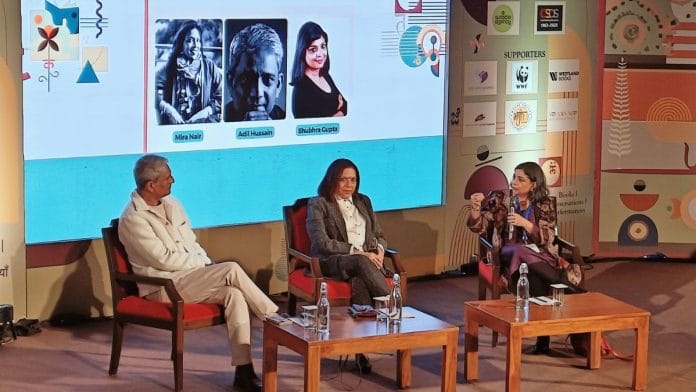New Delhi: Mira Nair wants to make a movie on the ongoing immigrant crisis in the US, which has resulted in hundreds of Indians being deported over the last two weeks.
“What is happening, the repatriation, if you call it, is so shocking. I need time to brew it, to know what one would say about it,” said the Oscar-winning filmmaker.
Nair was speaking at a panel on ‘Films and Migration’ for the Samanvay Literary Festival, held at India Habitat Centre on 15 February. Actor Adil Hussain was also part of the panel, while journalist and author Shubhra Gupta moderated the session.
“What I never want to do is preach to the converted. That is not enough. Entertainment is a big word, but while you take them into your world, you’ve got to make them see the world anew,” said Nair. The director is noted for her exploration of the immigrant experience, be it in Mississippi Masala (1991), The Namesake (2006), or The Reluctant Fundamentalist (2012).
The discussion focused on Nair’s experience shuttling between three countries for work and Hussain’s experiences of migrating from Goalpara, Assam.
Nizamuddin-upon-Hudson
Two films that came up, both in discussion and audience questions, were Nair’s Monsoon Wedding (2001) and The Namesake.
“You can really look through your window at the Hudson River and imagine the fragrance of frangipani in Nizamuddin. I used all these tricks in The Namesake,” said Nair. Based on Jhumpa Lahiri’s critically acclaimed novel of the same name, the movie was headlined by Irrfan Khan and Tabu, along with Kal Penn.
Nair also shared anecdotes about the film, including how she helped Khan nail his Bengali accent for the movie.
“Jhumpa’s father, a librarian, was the standard for the accent we wanted, but we had a Bengali caterer on the set of the film, and slowly, Irrfan started to sound like the caterer, which was thicker and much harder for the Americans or anyone to understand. So we had to tone down the caterer and up the librarian,” said the director with a laugh.
In the movie, Khan played the role of a first-generation Bengali immigrant Ashoke Ganguly, who moves to the US to work as a lecturer.
Nair had earlier cast Irrfan for his first film, Salaam Bombay! (1988) for a minor role, but his scenes were reduced in the final cut. At the time, Nair assured the actor that she would come back with a role for him. Fifteen years later, Khan auditioned for the role of Ashoke.
Gupta brought up Hussain’s latest movie, The Storyteller (2022), where he plays a Gujarati businessman, while Paresh Rawal plays a Bengali writer. The actors learned from each other to master their respective accents. Like Khan, Hussain had also auditioned for the very first time in his life for Nair’s movie. At the time, he was in his second year of college at the National School of Drama in 1992.
In The Reluctant Fundamentalist, Hussain played Mustafa Fazil, a Muslim activist and Mujahid.
Also read: Painter Ghulam Mohammad Sheikh lived on Rs 50 as student. His father pushed him to study
Brown person’s coming of age
Nair called The Reluctant Fundamentalist a ‘coming-of-age’ movie of a brown person. “When 9/11 happens, Changez is suddenly just a Muslim, and it makes him fall out of love of America. We have 100 White stories of coming of age but we don’t have our story in the global universe,” said Nair. She also called her movie an investigation of capitalism.
Nair’s movies have consistently tried to locate the Indian experience in the US in various ways. Her Mississippi Masala looks at interracial love, through an African American carpet cleaner Demetrius Williams (Denzel Washington) and the Ugandan-born Indian Mina (Sarita Choudhury). In the movie, Mina’s parents are driven out of Uganda by dictator Idi Amin and restart life in the US. The film brings out how colourism, racism, anti-Blackness, classism, and xenophobia exist across displaced communities.
Nair also shared how it was tough mounting a film after Salaam Bombay! when everyone just wanted a different version of the same film. There was reluctance about Black and brown protagonists. “A head of a studio asked if I could make room for a White protagonist, and I smiled and said, all the waiters in the film will be White, I can promise you that. He laughed and I was shown the door,” said Nair.
She remains committed to making films that only she can. “If things have been done before, I don’t need to do them. I can tell stories about migration because I know it,” Nair added.
The director’s film about the current immigrant crisis might, however, take some time. She is gearing up for the shoot of her upcoming film on painter Amrita Sher-Gil, which has been in development for the last four years. The film will be shot in India, France, and Hungary.
“The situation right now [the deportation] is horrific. I need time to process and answer whether I would make a film,” she said.
(Edited by Prasanna Bachchhav)







What is so shocking about a nation deporting illegal immigrants? Isn’t that the natural course of action?
Seems like Ms. Nair is done with abusing Indian culture and society. Now she wishes to put the spotlight on USA.
Good riddance!